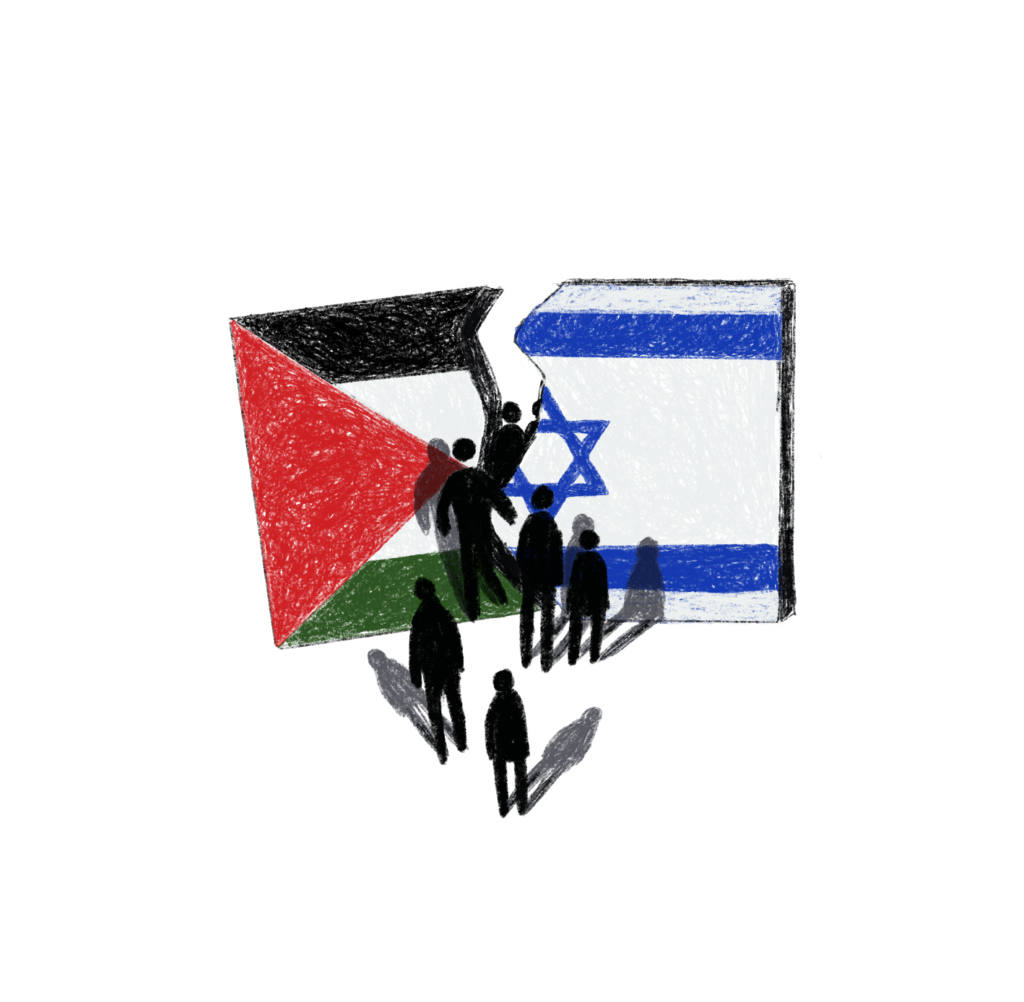
On the morning of Oct. 7, thousands of rockets were fired by Hamas, a military organization dedicated to replacing Israeli statehood with Palestinian statehood, towards parts of Israel. Armed members of Hamas began to fire on people near the borders of the Gaza Strip, and in many towns in the area. Israel retaliated with a series of deadly airstrikes and dispatching armed troops. According to the United Nations, the ensuing war has caused more than 1,400 deaths in Israel and 5,000 in Gaza as of Nov. 8. The number of Palestinian deaths is disputed with some estimates well over 10,000.
However, the conflict between Israel and Palestine is not recent. The Arab-Israeli War in 1948, which came as the result of high tensions in the region, sparked a series of conflicts that include the Six-Day War, Yom Kippur War, the two Intifadas and the Gaza War. More recently, there have been several military conflicts between 2006 and the current war.
This conflict had been deadly even before the recent events, with the United Nations reporting over 6,600 deaths from both sides from Feb. 1, 2008, to Aug. 31, 2023. Hundreds more continue to die as fighting continues, with reports of at least 100 killed at a hospital in Gaza City on Oct. 17. Many remain trapped in the Gaza Strip as airstrikes hit the region, worrying students who have loved ones living in the area.
“I talk to my best friend who lives [in Israel], and her life is just unimaginable to me,” said senior Galit Moff. “Just four years ago, we had very similar lives, and now I can’t even fathom what she’s living [through]. She has to run to a bomb shelter every night as missiles fall, and she can’t go to school or hang out with friends.”
Others like junior Ellie Rose have family in the area who have struggled to leave.
“My grandparents were visiting [Israel],” Rose said. “Instead of getting to hang out with their friends and see their family, they were stuck in bomb shelters and scared for their lives, unable to get a flight home. They recently got back, which I’m very grateful for, but it was really scary not knowing if they’d be able to come back.”
Unfortunately, many remain stuck amidst the growing conflict.
“My family members are in Gaza, and they’re being bombed a lot,” said sophomore Andrew Akkawi. “They have no power or water supply, because [Israel has] so much power over the area that they can just control all the water.”
Worried for their family, students seek and rely on support from peers to get through a tumultuous time.
“I’ve definitely appreciated the allyship and the few friends, students and teachers who have checked in, expressed concern and asked questions,” Moff said. “It really makes me feel more at home and makes me feel heard when people who aren’t Jewish are asking questions, trying to understand how I feel and what the situation is like.”
However, the level of support varies.
“I don’t think I’m really being supported,” Akkawi said. “A few of my friends understand, but at school people just make fun of [the war] or get in arguments, and I have to explain a bunch of stuff to them.”
Especially with news of the war taking social media by storm, many feel pressured to take a side.
“You can’t agree with everything a government does,” Rose said. “But I do believe Israel has a right to defend itself. There [are] definitely things I wouldn’t do or don’t agree with, but in general, I think [Israel is] trying to save people.”
As a Palestinian, Akkawi sides with his homeland.
“I don’t respect a lot of the stuff [Israel] does,” Akkawi said. “I have a few Jewish friends, but as a country itself, I don’t respect it: they took our culture, they took our food, they took our cities, they took everything from us.”
Junior Fouad Krayem stresses the importance of differentiating Hamas and Palestine.
“[Hamas and Palestine] are definitely two separate things,” Krayem said. “And you can even see that in the separation between the two Palestinian territories. The West Bank and Gaza are run by two completely different people.”
Some have adopted an apolitical stance, instead prioritizing the innocent citizens endangered in the crossfire.
“I don’t support anyone’s side,” said junior Fatima Khalil. “I support the innocent civilians, and anyone that’s in harm’s way. I don’t support Hamas and I don’t condone anything the Israel Defense Forces do.”
Aragon administration, as well the San Mateo Union High School district, has chosen to stay neutral, condemning the violence without commenting on the actions of any specific parties.
“I understand [the school’s decision], but I think keeping a neutral stance on genocide is a questionable take,” Krayem said. “I try to talk to my teachers about it. And they kind of just point the conversation in different directions.”
After releasing a statement from the district about the conflict, Superintendent Randall Booker issued a correction following backlash due to the fact that he did not call out attacks on Israel specifically.
With the world’s increasing reliance on social media, platforms like Instagram have become a source of information for many on the war, but it also remains a platform for discrimination.
“On social media, I see a lot of anti-semetic things and it’s hard to feel safe,” Rose said. “I’ve posted on Instagram in support of civilians that have died and in support of Israel, and I got a reply that was pretty direct and not very kind.”
Social media also allows people to see the conflict firsthand through live footage and near immediate updates.
“I’d wake up in the morning and the first thing on my feed was a building getting completely demolished, or a kid getting his head blown off,” Krayem said. “It just makes you sick to your stomach. And knowing that those are your people. It really does make you sick.”
The purpose of this article is to share perspectives from students who are personally affected by the conflict. This is by no means a comprehensive history; please feel free to conduct your own research.
Have thoughts about this article? Fill out a Letter to the Editor at aragonoutlook.org/contact. We would love to hear from you.




